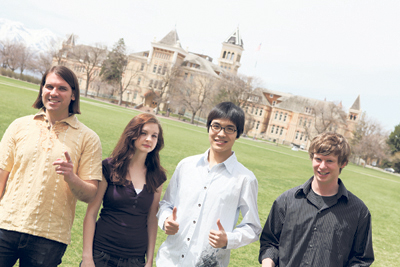Students shine at national competiton
Four USU students traveled to Washington, D.C., to compete in Microsoft’s Imagine Cup competition and placed second overall for a Facebook application aimed to boost the success of entrepreneurs in third-world countries.
The team is comprised of Cal Coopsman and Yiding Han, Ph.D. students in electical engineering; Josh Light, senior in economics, finance and entrepeneurship and Susanna Beck, who is majoring in general education.
The Imagine Cup is the largest software competition in the world, and USU students took home $4,000 in prize money because of their software idea, Aidventure, which can be added by anyone as an application on Facebook. Their second place title was held under University of California-Los Angeles who took the grand prize and will compete in Poland during the international competition, Light said. Purdue University, who took first place, will also compete in Poland. There were 22,000 competitors in the competition.
“I wanted to win the whole thing, and I presented as hard as I could,” Light said. “I could tell the audience was sold on the idea.”
Light said that upon arriving in Washington, D.C., on April 23, he and his team were introduced to the area and the competition events. On Saturday morning, the team was prepared to present their idea to a panel of successful entrepreneurs, tech-savvy Microsoft employees and a slew of others respected in the business world.
Coopsman said Microsoft spent approximately $500,000 on press for the event.
Because of the large event, Microsoft employees were able to familiarize themselves with Aidventure and gave USU’s team positive feedback on the idea, Light said. He said some expressed interest in making the idea a booming reality that could potentially take many entrepreneurs out of poverty around the globe.
“Without Microsoft’s crazy go-show, we wouldn’t be where we are with this idea,” Coopsman said.
Light said, “The Microsoft guys said they would be able to help push us forward by helping with office space in other countries and getting aroud the political barriers.”
Coopsman competed in the Imagine Cup competition in 2009, as well, and said he didn’t pursue the success of the idea any further after the competition. However, he said because the Huntsman School of Business is involved in the progression of Aidventure, its success is a “done deal,” as far as he is concerned. He said the momentum in the business school is unshakeable.
The Imagine Cup is less about making a large profit and more about innovating a way to help mankind, Coopsman said.
“As an engineer, I’m not really motivated by money,” Coopsman said. “Helping people is the best place I can be.”
The Facebook application works by first adding Aidventure and then browsing the different entrepreneur profiles. The profiles show the entrepreneur’s business plan and business training experience. Most of them have received business training through the business school’s SEED program, which sends business students to countries around the world to teach the principles of business for internship credit.
Facebook users then put money into an entrepreneur’s business that they believe will thrive and can put it as little as $10, Light said. The money goes toward helping the entrepreneur purchase necessities for his business and depending on its success, the Facebook user who invested in the company will receive returns. Light is working with Kingsbridge Financial Bank to work out the details of all transactions that will take place. He will travel to their location in Africa this summer for an internship. While in Africa, he will assist with the necessary paperwork involved in investing, which is issued by the Security Exchange Commission
Light said he enjoyed meeting and exchanging ideas with fellow young entrepreneurs from across the country.
“The Yale team was pretty cool,” Light said. “I ate lunch with them, and I thought they would be real pompous, but they weren’t any different than a lot of Utah State kids. They just have more resources to work with.”
– catherine.meidell@aggiemail.usu.edu

